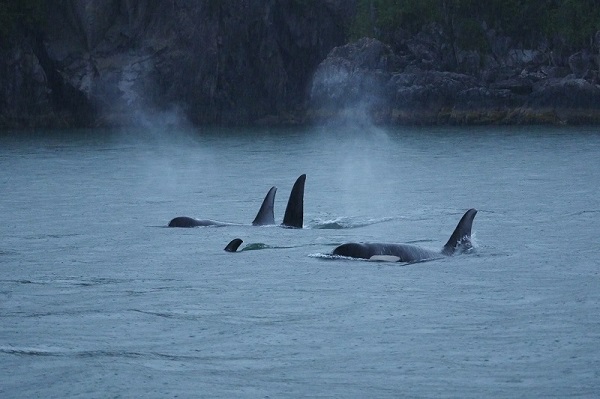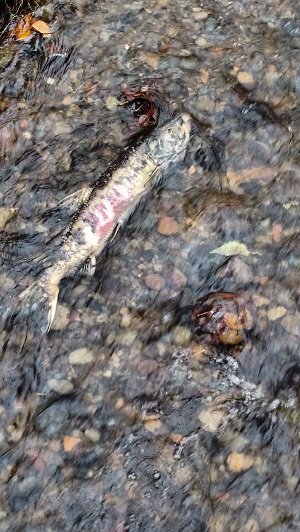By Florence Sullivan, MSc, GEMM Lab Graduate
It’s rather amazing how, in a span of five years, the journey of your life can take twists and turns that you never expected. Long time blog readers may remember me as the graduate student who began this blog way back in February of 2015 with a recitation of our lab’s very first science outreach event. Since then, I completed my master’s thesis investigating gray whale foraging ecology (a project that just finished its 6th field season thanks to the excellent leadership of Lisa Hildebrand), fulfilled a dream of working as a marine mammal observer, and survived the existential crisis of graduation and job searching.
None of the species we study in this lab forage in straight lines. If we consider a job (and salary) as the mechanism by which most of us put food on the table (i.e. foraging) why should our path be any less complex than theirs? By April 2018, I had moved back in with my parents in Seattle and was thoroughly heartsick about how long my job search was taking, so I jumped on the first field opportunity that came my way. The project was billed as an attempt to pair discrete killer whale behaviors to specific call sequences, with collaborators from a variety of countries and backgrounds. In my enthusiasm, I ignored some red flags, and paid for it with a field season where I (1) experienced my first person-overboard situation, (2) witnessed steady verbal harassment, (3) was injured when our live-aboard trimaran was run aground on a clearly marked reef, and (4) ended up committing mutiny and leaving the project early. There have been encouraging discussions in the marine science community recently about the barriers that women & early career scientists face while in the field, particularly with regard to accessibility, equity, and unpaid/underpaid internships. I will add some learned lessons to the list of things one should consider before embarking on a new research endeavor:
- If someone says they are affiliated with a university, but will not give you a project or lab website because ‘the project is quite delicate, we don’t want other folks stealing our work’, check that they actually do have university affiliations and aren’t misrepresenting their connections. Do some homework.
- Don’t cross a border without a contract, and when repeated attempts to secure a description of your responsibilities and payment are put off until later, consider that this might be a pattern of behavior.
- If you were told that you would work under a senior bioacoustician, and you show up to find that your new colleague had been told the same thing, but neither of you has more than a MSc degree or much experience with acoustics, add this to your tally of red flags.
- If basic safety standards (like wearing a life jacket on deck) are being ignored, hold yourself to a higher standard, and lead by example.
- If sustained verbal and emotional abuse is occurring, you still have not been paid, and you’ve been asked to keep working after being injured in an accident caused by negligence, it is ok to break faith and leave a project.
Entering this project, I was very keen to learn new skills in acoustics, study a new species, and build partnerships with international researchers. Instead, I learned about interpersonal conflict and resolution strategies. So, time for a new plan & another bend in my path. Thankfully, I have the immense privilege of a capable, employed husband who was able to support me while I recovered and began a new job search.


In the year that followed, I joined the team at the Environmental Science Center and taught 3rd -10th graders how to be “Salmon Heroes”. I explained salmon ecology, taking them on field experiences where we dissected salmon, measured oxygen and nitrogen levels in salmon streams, assessed habitat quality, observed migration and spawning behaviors (when fish cooperated), and brainstormed ways to protect these special (and delicious) fish.
When salmon season came to an end, we transitioned to the “Beach Hero” program, targeted at K-3rd grade, where I became part of the classroom team, teaching intertidal ecology before bringing the kids to the beach where many of them experienced low tide for the first time. In keeping with the education theme, I also worked with South Sound Nature School to provide kids with a forest-based after school program and was a summer camp counselor at Camp Long for several weeks. Still, I continued to try to find my way back to research and a data-driven career.

Another bend in my ‘foraging’ job search happened when I stumbled across a short term data contract at my local election office while searching the state and county job boards. Washington State is a vote-by-mail state, and with a record turn-out in the 2018 mid-term elections they needed help updating everyone’s contact information & verifying signatures. Let me tell you, staring at a computer screen, deciphering people’s handwriting to add emails and phone numbers to their voter registration for 8 hours a day for 6 weeks was not particularly fun. Yet, it gave me a little more experience in government databases, and gave me a lot of confidence in my election office for how transparent they are about every step of the voting process. I can’t speak for anywhere else, but in King County (Washington), you can go visit the election office & give yourself a self-guided walking tour of the whole ballot counting process from arrival to sorting to signature verification and opening to tallying. (There’s a hallway with massive windows surrounding the giant open concept floor space where everything happens, so you can observe without interfering). I’d never thought about what happens to my ballot after I mail it before, and its rather fascinating. Speaking of which, Please Vote!
Frustrated by a job search that failed to yield anything with health benefits or more than part-time hours, my Dad suggested that I apply to the University of Washington Continuing Education program, and enroll in a professional certificate to add another explicit skill to my resume. When enough pressure is applied to the system, something has to give eventually. The month where I was accepted to the UW Certificate in Statistical Analysis with R Programming was also the month I started interviewing for the Research Analyst Position at the Pacific Whale Foundation. Partially because I could prove my data management experience, and that I was serious about continuing to hone my skiIls, I was offered, and accepted the position! Hilariously or stressfully, however you want to look at it, I moved to Maui, began my new position, and started my statistics with R programming coursework all in the same week – the learning curve was STEEP.

I completed my certificate in June, and hit my one-year work anniversary last month! I’m responsible for a good portion of our database management, and use R coding on a daily basis to pull data requests, tidy historical data, and add new information. I’d never been to Maui before moving here, but now I’ve experienced the glory of Humpback whale breeding & calving season and heard whale song underwater. I’ve helped collect important life history data for false killer whales, spotted, spinner & bottlenose dolphins, and I’m looking forward to encountering more new-to-me odontocete species. It took months before I felt like I was past the ‘onboarding’ information stage, but now I’m collaborating with my colleagues on my first data analysis project (rather than simple data management) and loving my team despite the wrenches that the pandemic has thrown in our work. My job search = cetacean foraging analogy breaks down a little at this point, but my story still stands. I acknowledge my privilege of a good education and supportive husband, but I have this suggestion for job seekers: Don’t be afraid to get creative while you search for the right position, because you never know what you might stumble across and learn along the way. In the process, do your best to catch red flags, and keep yourself out of dangerous positions. My job search hasn’t been a straight path, but that doesn’t mean it wasn’t full of small victories, and it did ultimately lead to a successful “prey patch”.
